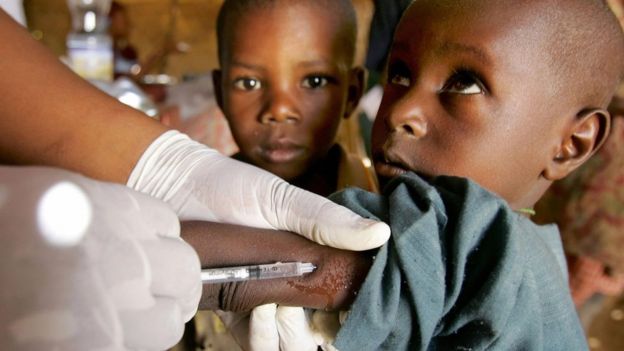
In our series of letters from
African journalists, novelist and writer Adaobi Tricia Nwaubani looks at
whether a culture of blaming everything on destiny is holding Nigeria
back.
The recent meningitis outbreak, which has so far claimed
almost 450 lives in Nigeria's north, may have exposed one of the reasons
why that region of the country continues to have some of the grimmest
statistics in almost every area of development.
Even before the
Boko Haram militant Islamist insurgency, there was alarmingly high
figures on infant and maternal mortality, poverty, child marriage,
children out-of-school, to mention but a few.
The region is also
one of the few in the world that is yet to be certified free of polio,
the infectious disease that often cripples children.
When it comes
to the meningitis outbreak, Zamfara state has suffered the most deaths
and hospitalisations out of all those affected.
While addressing journalists recently, State Governor Abdulaziz Yari
absolved his administration of any responsibility for the disease's
spread in his state.
Instead, he said the problem was that people have been sinning against God.
"People have turned away from God... that is just the cause of this outbreak as far as I am concerned," Governor Yari said.
"There is no way fornication will be so rampant and God will not send a disease that cannot be cured."
In
accordance with his belief about the health emergency's origin, Mr Yari
proffered a solution which has nothing to do with any action or
inaction on the part of his government.
"The most important thing is for our people to know that their relationship with God is not smooth," he said.
"All they need to do is repent and everything will be all right."
These
comments have drawn criticism from many Nigerians, notably from Sanusi
Lamido Sanusi, the emir of Kano, who is one of the country's most
important Muslim leaders.
But Mr Yari merely amplified an attitude that is not uncommon in the country.
In the 2011 post-election violence that broke out in parts of
northern Nigeria, nine recent university graduates assigned to work with
the electoral commission in Bauchi state were killed.
Isa Yuguda, the state governor at the time, ascribed the young people's deaths to a higher force.
"They were destined to experience what they experienced," he said.
"Nobody can run away from their destiny."
He added that human beings should always accept their destiny, whether or not it was "in our favour or against our interest".
Thus,
Governor Yuguda implied that there was nothing his administration could
have done to protect the young lives from their ghastly fate.
In January, I met a 21-year-old woman in Maiduguri, north-east
Nigeria, one of the millions of people displaced from their homes by
Boko Haram.
While living in a camp for displaced people, she was
befriended by a man who works with the Civilian Joint Task Force (CJTF),
a group of that was formed to help oust Boko Haram.
One night two years ago, he locked her up in his official vehicle, muffled her screams and raped her.
A few weeks later she discovered that she was pregnant. Her family, his family and the local CJTF boss intervened.
They
decided that the victim would marry her rapist. That was the best way
to save her from the shame of being a single mother, they believed.
She told me that she did not imagine any better alternative herself and so willingly went along with their decision.
Thus,
she became the third wife to a man who was paid by the government to
protect her and other refugees; a man who raped her and fathered her
first child in the official vehicle he had been provided to carry out
his job of protecting her and other vulnerable people.
I was keen
to know what her husband felt about what he had done to her, how he had
so brutishly altered the course of the woman's life forever.
"He told me that is the way Allah wants it," she replied to me. "He said that is my destiny."
This attitude of attributing life circumstances to forces beyond people's control is antithetical to progress and development.
It
is impossible to cultivate a spirit of innovation and transformation
when people believe themselves helpless about their plight.
Some northern Nigeria leaders are, thankfully, starting to speak out against such regressive beliefs.
The Emir of Kano described Governor Yari's comments as "Islamically incorrect".
"When
we talk about a difficult environment, we realise that 90% of that
difficulty, we can address, because it is self-inflicted," the Emir
said.
No comments: